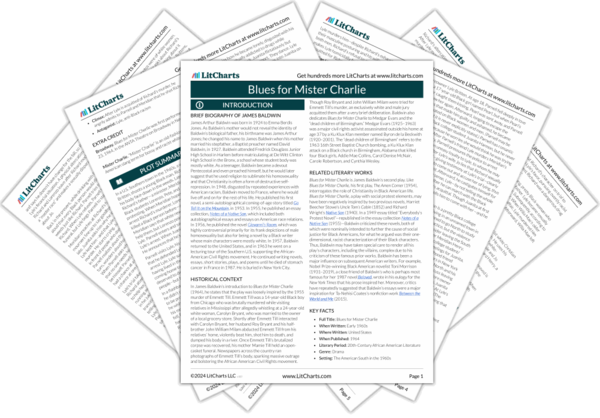Blues for Mister Charlie implies that white supremacy is driven, in part, by white economic anxiety—a fear of competing on a level playing field against Black people for money and job opportunities. The white character with the most progressive racial attitudes, Parnell James, is independently wealthy; by implication, it is easier for him to espouse ethical attitudes about racial justice because he need not worry about money—and thus does not worry about whether, in a racially just society, a Black person might be hired before him. By contrast, the white character whose violent racism leads to the play’s central conflict, Lyle Britten, is represented as a “poor white” anxious about his economic status and his baby son’s economic future. Lyle eventually murders a young Black man, Richard Henry, for what he perceives as Richard’s humiliation of him in a fight. Tellingly, though Lyle and his wife Jo will later push the false narrative that Richard sexually assaulted Jo, the fight was largely precipitated by Richard mocking Lyle for not having enough change for a 20-dollar bill. In other words, Lyle kills Richard after Richard humiliates him economically. In the same vein, Parnell later gets into a fight with a racist white man about racially biased hiring practices that ends with the other man declaring that white men must be hired before Black people. Thus—while the play also explores the social, sexual, and religious underpinnings of racist violence—it also suggests that economic anxiety plays a major role in white racism.
Money and Opportunity ThemeTracker

Money and Opportunity Quotes in Blues for Mister Charlie
Parnell: He’s a poor white man. The poor whites have been just as victimized in this part of the world as the blacks have ever been!
Parnell: It means that if I have a hundred dollars, and I’m black, and you have a hundred dollars, and you’re white, I should be able to get as much value for my hundred dollars—my black hundred dollars—as you get for your white hundred dollars. It also means that I should have an equal opportunity to earn that hundred dollars—
Richard: Maybe your wife could run home and get some change. You got some change at home, I know. Don’t you?
Lyle: I don’t stand for nobody to talk about my wife.
Lyle: You ain’t no better than me!
Parnell: I am aware of that. God knows I have been made aware of that—for the first time in my life.











